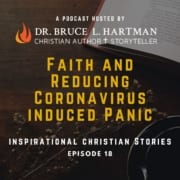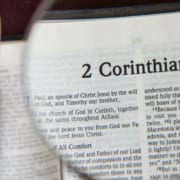Hebrews: Jesus Our Mediator with God
Jesus Christ is the same yesterday and today and forever.
Hebrews 13:8
Around 65-70AD, Christians in the Roman Empire suffered severe persecution at the hands of Emperor Nero. Prompting some, notably Jewish Christians to want to return to Judaism to avoid persecution. Forgetting the purpose of Jesus.
Their lives had become very uprooted and desperate. Their livelihoods and social status were threatened. Their only way out was to either follow the Roman Gods or return to Judaism.
In response, a very skilled author wrote the book of Hebrews to this group to exhort them to maintain their faith in Jesus. To not forget that Jesus had come to earth in human form to die for their sins and become their intercessor with God.
Traditionally, this letter was assigned to Paul, but likely not. The language of the letter, while very complex, like Paul’s writing, has far fewer personal comments and doesn’t follow Paul’s normal style of bold assertions. Instead, it is written almost like a very logical legal defense. Many people have been assigned the authorship; from the author of Luke to Clement of Rome, one of Paul students or even Apollos.
Origen, the great early Christian historian, says it best regarding the authorship, who wrote the epistle is known to God alone. I agree with Origen and find trying to figure out who wrote this masterpiece is a distraction to the wonderful message of the good news of Jesus, which is contained in Hebrews.
But this is a very hard book to read and understand without knowing in advance what and where the author is saying and going. So let me try to help with some background information.
This well-crafted letter is a defense of Jesus’s purpose and the author goes to great pains in writing specifically to the Jewish Christians. His point is; Jesus came as the highest priest and is humankind’s’ intercessor with God. Laying out his case with repetition and constantly referring to Judaic tradition. While this makes for harder reading by the 21st-century reader, knowing this in advance helps a lot.
We see this appeal in the opening sections or prologue, chapters 1-4. The author compares Jesus to Moses, one of the great heroes of Judaism. Explaining that Moses was human and subject to human frailties. And Jesus, while on earth was A perfector. Later saying Jesus was above all things; including Moses, Abraham, the prophets and the angels of God. Finally, you will note in the opening chapter, fairly extensive quotes from ancient Jewish scripture that identify Jesus. All to help the Jewish Christians understand the connection between their traditions and Jesus.
This appeal allows for two critical points. The first, to build up the Jewish Christians receptivity by using their traditions. The second, to make his case that Jesus was a continuation of the history of Judaism.
One of the more interesting and for many an obscure Old Testament reference occurs in Chapter seven, The high priest Melchizedek is brought in to the defense. The author compares Melchizedek as a different kind of priest, not one borne as a human, like the Jewish priests. But one who was with Abraham after a great victory. And to whom Abraham gave ten percent of his loot from a recent battle.
This part is a little confusing and for the reader a little overwhelming in trying to understand the author’s point. In part, because of the author’s commitment to proving to the Jewish Christians, that Jesus is the one. Melchizedek is a Biblical character not borne of human sources, and those with a deep knowledge of Judaism would know about him. By comparing him to the human high priests and then saying Jesus was from the same source, he makes the argument Jesus was the highest priest. This section was strictly for Jewish Christians of the 1st century, but for 21st century Christians, it appears to be a little confusing. So when you get to this section, not having this knowledge will cause strain in understanding.
It is also most important for the author to point out that Jesus is the intercessor to God for humankind. His basic argument is that Jesus was both human and divine. In His human state, Jesus died on the cross to absorb all human sin. In doing so, in His divine state, he can appeal to the Father on our behalf.
This last point is the theme of Hebrews for the larger audience, Jesus and his role as mediator between God and humanity. This is why we should end every prayer with, In Jesus’ name we pray. So when we read this book, these are the two critical factors to keep in mind when trying to understand the author’s points.
He is asking Jewish Christians to have faith and not give up. While stating Jesus is the only connection to God. Not Moses, Abraham or the prophets.
This appeal or defense of Jesus is made in many different ways, but always addressing one of these two points. For instance, in Hebrews 13:8 it says, Jesus Christ is the same yesterday and today and tomorrow. In other words, Jesus existed at the beginning, through Jewish history, is here today and for eternity.
In the opening chapter, he states it another way, by saying; The Son is the radiance of God’s glory and the exact representation of his being, sustaining all things by his powerful word. After he had provided purification for sins, he sat down at the right hand of the Majesty in heaven.
Notice it says, provided purification for sins. This is the act that created the connection between us and God.
In chapter seven, we get another verse on this point, where it says; Therefore he can save completely those who come to God through him because he always lives to intercede for them.
This theme is very prominent throughout Hebrews and is expressed in many ways.
While the author is laying out his defense of Jesus, he also appeals to this Jewish Christian group to maintain their faith, despite their circumstances. Essentially, the author builds his case that we can rely on Jesus’s role and now explains what faith is; to encourage the Jewish Christians to not give up. Again using multiple repetitions to make his point.
Perhaps the most famous verse in Hebrews is in 11:1 and best states his position, it says; Now faith is confidence in what we hope for and assurance about what we do not see.
In a different way, but still using the word confidence, it says in [4:16]; Let us then approach God’s throne of grace with confidence, so that we may receive mercy and find grace to help us in our time of need.
Before we close, I would like to add, while this is a very complicated book and the language can at times be daunting. There is another option for reading Hebrews than our standard Bible. Try getting access to the Message Bible and read Hebrews with a modern interpretation. It will help a lot!
Once again, we have a masterpiece in the New Testament that was written to a very specific group, Jewish Christians, that transcends time and place. Even in the 21st century the message of sticking with our faith, even under duress, is still very relevant. And the very detailed explanation and theme of this book of Jesus as humankind’s’ intercessor is most important to understanding our faith.
Well, I hoped I piqued your interest in this book and provided you with insight that will allow the book to move from complicated to understand.
So the next time you pray and say, In Jesus’ name I pray, You will know why.
Click here to listen to the podcast
Blessings, until next time,
Bruce L. Hartman
Photo by Thanti Nguyen on Unsplash
We love to give credit to budding photographers










